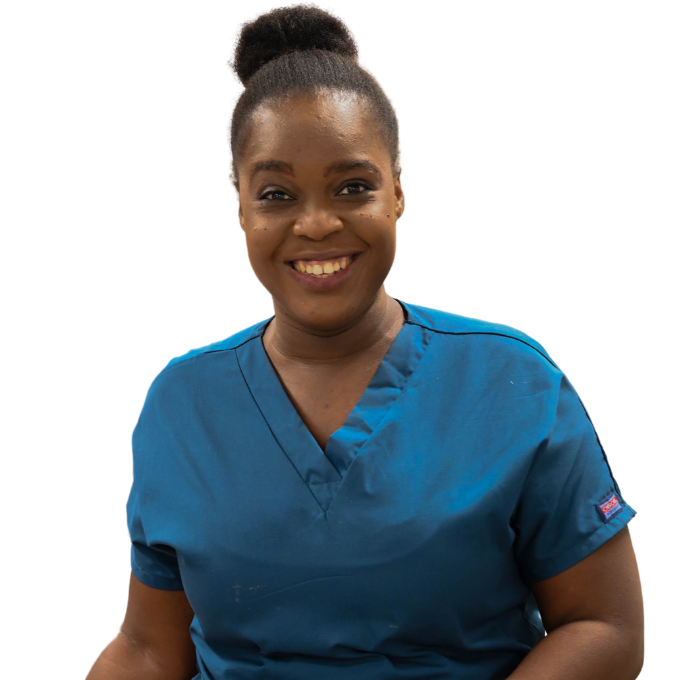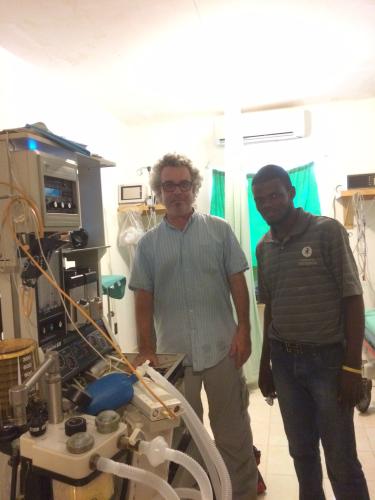“We value making patients feel welcome.”
Your donation will help Nurse Laguerre provide the highest-quality care to every patient in need.


The 5.9 magnitude earthquake that struck northern Haiti on October 6, 2018, caused extensive damage to hospitals in the cities of Port-de-Paix and Gros Morne. While coordinating relief efforts with the Haitian Ministry of Health (MSPP) and our colleagues in the affected area, HEI/SBH learned that key pieces of medical equipment were not functioning, preventing the hospitals from providing urgent care to earthquake victims. Thanks to our Reparation Pou Amelyore Ekipman Medikal (REPARE) program, St. Boniface Hospital’s Chief Biomedical Engineering Technician, Tom Monaghan, was able to travel to northern Haiti to provide support. With the repairs and on-the-ground training Tom provided, the technicians can now diagnose and fix the equipment should these issues arise again.
Tom has been leading the REPARE program since it began in October 2016, thanks to a public-private partnership with the U.S. Agency for International Development and the General Electric and W.K. Kellogg foundations, as well as our local partnership with the MSPP. REPARE is a biomedical engineer training program designed to address biomedical equipment management in Haiti. Broken and poorly-maintained medical equipment is a pervasive problem throughout the country, which has dire consequences for patients in need of urgent, lifesaving health services. By training Haitian technicians to properly diagnose problems, repair, and maintain medical equipment, the REPARE program is helping to build a sustainable, replicable model for managing biomedical equipment throughout the country.
The bulk of Tom’s work took place in Gros Morne, which received some of the most extensive damage from the earthquake. There, Tom worked with Tony, a REPARE trainee who spent over one month intensively studying biotechnology at St. Boniface Hospital. Since Tony returned to Gros Morne, he and Tom have remained in close communication about equipment repairs and other issues that have arisen. In addition, Tom has traveled to Gros Morne several times to provide additional assistance and on-the-ground training to Tony and his colleagues.
HEI/SBH’s Chief Biomedical Engineering Technician, Tom Monaghan, fixes an x-ray machine after the October 2018 earthquake in northern Haiti.
One of the issues Tom and Tony tackled was an x-ray machine that began malfunctioning after the earthquake. While examining the equipment, Tom noticed that the machine was manufactured in 1972, making it over 46 years old. Although Tom was able to diagnose the problem and identify the parts needed for the repair, it will take a great deal of time to actually source parts from nearly five decades ago. This is a typical problem for many hospitals in Haiti and other low-resource settings, where hospitals are working almost exclusively with donated equipment. Tom and Tony will continue working closely together to obtain the parts and bring the machine to working order as soon as possible.
After the x-ray machine, Tom turned his attention to three infant warmers—critical for the care of newborns—that nurses reported were not working. After Tom examined the equipment, he found that the warmers were simply not being operated correctly and provided the necessary training to both the nurses and technicians to prevent further usage errors. This example highlights the importance of clinical training in keeping equipment in use. When clinical staff and technicians are provided with basic equipment training, they can help ensure that equipment failure does not stand in the way of delivering life-saving care that their patients desperately need.
HEI/SBH is proud of our REPARE trainees like Tony, who are helping to raise the level of medical care provided in the most remote regions of Haiti. The REPARE program is not just helping to address medical equipment challenges: it is strengthening Haiti’s health system on a nationwide scale, saving lives, and ensuring that more Haitians have access to the essential health services that they deserve.
Your donation will help Nurse Laguerre provide the highest-quality care to every patient in need.
